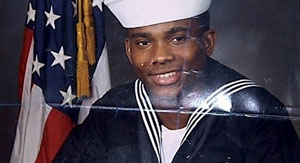U.S. Navy Veteran Howard Bailey shared his family's story April 28 during a virtual briefing for advocates and press in which NIJC and our partners called on the Biden administration to establish a meaningful chance to come home for people who have been unjustly deported.
Good afternoon—my name is Howard Bailey. I am an honorably discharged veteran of the US Navy. I served in both Operations Desert Storm and Providing Comfort. I joined the military right after high school to serve my country.
I have now been living in exile for eight years—10 years if I include the two I spent in immigration jail fighting my case.
Before I was deported to Jamaica, a country I had not seen in nearly 25 years, I was a happily married man, with two American kids, and a home I purchased with my VA loan. I owned my own trucking business with four employees and paid my taxes. In my mind, I was living the American dream.
The last time I saw my home was in June — 10 years ago — and since then life feels like a total nightmare. Every day I hope that I will wake up and just be back home in Virginia again.
In 1995, about six months after I got out of the military I was charged with possession of marijuana. I was about 22 years old. It was my first time ever being arrested. I didn’t know I had marijuana delivered to me in a package. I told the cops and they said not to worry.
But I still had to go to court. My lawyer told me: “this is just a slap on the wrist, we are just going to plead guilty.” Being young and naïve, I listened. Twenty-five years later—I am still paying.
In 2010, 15 years after I was arrested for the marijuana thing, ICE showed up at my front door to take me away because I was too honest.
I applied for U.S. citizenship and when the application asked if I had ever been convicted of a crime I said yes. I even went to the courthouse to get the paperwork to show that the case happened.
Then one day I was home and I heard a knock on my door around 5:30 in the morning. When I answered I saw all these guys in khaki suits and a state trooper. I got so scared. I had no idea what was happening.
Then I realized it was ICE and they told me they were taking me because of my marijuana conviction — even though it was so many years before.
They grabbed me and didn’t care that my 11-year-old daughter came out screaming and crying. My wife begged them to let her give me pants to wear before they took me away since I was in my pajama shorts.
I haven’t seen my own daughter in 10 years. My deportation traumatized her. Her mental health suffered all through her teenage years and into today. She didn’t make it to college — her dream and mine too. It ripped my heart that my daughter was hungry — and I couldn’t do nothing.
My son has had troubles with the criminal legal system. I blame myself. I wasn’t there when he needed me most. Young men in America need their fathers. He had just turned 14 when I was dragged away by ICE.
As I sit here every day it has been extremely hard — it’s not just hard on me — it’s hard on my entire family.
Before my deportation, I fought my case for two years from immigration detention. I was moved around from one detention center to another: Hampton Roads, New York, and Louisiana.
After I was deported, I got a pardon from the governor of Virginia for my marijuana charge but I still couldn’t come home. The governor told me that his hands are tied and that he can’t make ICE do anything.
Many people have tried to help. Even the senator from West Virginia tried to convince ICE. But ICE still won’t budge.
Thank you for listening today. My name is Howard Bailey and I do love my country, the USA. Go Navy.
Read NIJC's full proposal for how the U.S. government can create a centralized process to review requests to return to the United States in our new white paper, A Chance to Come Home: A Roadmap to Bring Home the Unjustly Deported.
Follow #ChanceToComeHome on Twitter to help us raise awareness of Howard's story and others who need an opportunity to apply to return to the United States.


